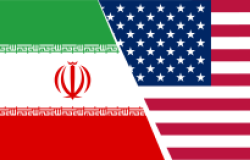Reactions From Wilson Center Experts to the Iranian Attack Against Israel
On April 13, Iran initiated an extensive drone and missile assault on Israel, retaliating against the Israeli strike on an Iranian consulate in Syria, a significant escalation in the region. Wilson Center experts and fellows analyze the events transpiring on the ground in the military, diplomatic, and political dimensions. This article will be updated as the situation develops.

Rokas Tenys / Shutterstock.com
The views expressed in these entries below are those of the authors and do not express the official position of the Wilson Center.
Amb. James F. Jeffrey
Chair, Middle East Program
This is an extraordinary victory that, overnight, has changed Israel back into victim and victor with much help from a full-throated, American “stand by your partner” posture like the old days.
The Iranians, by their massive but failed military response to Israel’s Damascus strike, have brought the entire October 7 Gaza discussion back to the key underlying factor: Iran and its proxies’ decades-long effort to dominate the region and tank stability at the expense of Arab states and of Turkey, Israel, the United States, and Europe.
We still have to wait and see whether and how fast the Israeli government or Washington—with what I can only describe as death wishes driven by domestic pressures—may turn “lemonade into lemons” with ill-conceived tactics ranging from Washington dictating how to finish Hamas to Israeli retaliation, however unnecessary at this point.
Yeganeh Torbati
Fellow, Middle East Program
We are now in a uniquely dangerous moment with the potential for escalation into an all-out war that would put the lives of millions of civilians at risk. Already, it is ordinary Iranians who have paid the price: in the hours after Iran's attack on Israel, the rial plummeted to 700,000 per USD, a record low and a further immiseration of a long-suffering populace. In a panic over potential shortages, Iranians have rushed to line up at gas stations in Tehran.
The Iranian government has said on social media that "the matter can be deemed concluded" and warned the United States to stay out of it—a signal that it does not wish to ratchet up tensions further. From a domestic perspective, it is hard to see how a war with Israel benefits Iranian supreme leader Ayatollah Ali Khamenei, who has ruled since 1989. The Iranian people, who remember the devastation of the Iran-Iraq War of the 1980s, are unlikely to support such a war, raising the potential for a new round of domestic unrest that the regime would surely respond to with brutal suppression. A military conflict could also exacerbate the long-existing factional divides within the regime, further eroding its support.
But Khamenei is also an ideologue, and he must contend with the hard-right regime elements he nurtured and supported during his 35 years in power. Enmity with Israel is an ideological pillar of the Islamic Republic. The operation, titled "Va'deye Sadegh," or "True Promise," was a reference to fulfilling the promise of the 1979 revolution. After the attack, IRGC commander Hossein Salami said that a "new equation" had been established in which Iran would directly respond to any Israeli attack on Iranian interests or citizens. Even if tensions are somehow defused in the short-term, we are now in a new and more dangerous era.
Robin Wright
Distinguished Fellow
Given the size of Iran’s various arsenals, its attack on Israel was modest and totally ineffective. The limited scope of Iran’s operation indicates that it does not want a full-on confrontation with Israel or the United States anytime soon. At the same time, the war between Iran and Israel—which began in 1982 in Lebanon—is no longer playing out in the shadows. Whatever Tehran says about this being one-and-done, there’s no going back. Both sides know it. Iran and Israel have crossed a strategic threshold.
Looking ahead, Israel is playing the short game—against Iran and in Gaza. It has long had a far superior military and has now proven its deterrent capabilities. It has a track record of destroying the military infrastructure, intercepting arms transfers, and killing key players in Iran’s Axis of Resistance network. And it has the bomb in its back pocket. Yet Israel also has no long-term strategy beyond often unrealistic platitudes about annihilating its various enemies. Even if it could, it has no visible political or diplomatic plan for what happens next with or in either Iran or Gaza.
Meanwhile, Iran is playing the long game across the Middle East. It is a revolutionary regime that is dangerously paranoid. It has the largest missile arsenal in the region. Since 1982, it has built a network of allies in four countries—Lebanon, Syria, Iraq, and Yemen—that have already directly confronted Israel. It has created havoc across the region. But its rhetoric bravado about defeating Israel and forcing US troops out of the Middle East is unattainable.
The bottom line is that neither side can “win” against the other in any conventional or unconventional sense, and neither side is going to concede long-term. Therein are the dangers.
David Ottaway
Fellow, Middle East Program
With Iran’s first direct attack on Israel, the two sworn enemies have entered a far more dangerous phase in their long-standing confrontation. While little damage was done, the attack illustrated that Israel remains extremely dependent on the US, and to a lesser extent, the UK, France, and even some Arab neighbors, to defend itself successfully from such a tsunami of Iranian missiles and drones.
The question now is if Israeli Prime Minister Benjamin Netanyahu ignores President Biden’s entreaties to forgo a retaliatory strike against Iran, whether Israel can keep this coalition together and on its side. At this point, it seems Israel is the only country ready and pressing for an escalation. But if it does strike back, Israel risks triggering an endless tit-for-tat with Iran up the escalatory ladder toward a general Middle East conflagration.
Biden has already warned Netanyahu that the United States will not join Israel in retaliation. If this proves true, the pro-Israeli coalition the Israeli prime minister has just enjoyed will likely prove fleeting. Israel could well find itself even more isolated internationally than it already was because of its controversial tactics in Gaza during its war with Hamas. Most consequentially, Netanyahu could turn Biden, his most ardent defender, irrevocably against him and undermine US support for Israel just as it is entering open warfare with Iran for the first time.
Marina Ottaway
Fellow, Middle East Program
With ample support from the United States and European countries, Israel has impressively demonstrated its capacity to defend itself against a massive Iranian air attack. Unfortunately for Israel, such prowess does not significantly affect the fundamental political equation or suggest that further escalation of the conflict will advance Israeli interests.
The Gaza war is no closer to a solution; in fact, the possibility of a ceasefire and the return of hostages have suffered another setback. Hamas remains determined. The West Bank is seething. Public hostility in Arab countries is high, and governments prefer not to further inflame their public with displays of support for Israel. And US and Western support, despite the resounding rhetoric, is tenuous and could quickly dissipate if Israel launched another cycle of retaliation.
In considering its next move, Israel needs to think carefully about the outcome it wants rather than focusing on the short-term satisfaction of another demonstration of military prowess because there is no military solution to Israel’s problem.
About the Authors

James F. Jeffrey
Former ambassador to Iraq and Turkey, and Special Envoy to the Global Coalition To Defeat ISIS

Robin Wright
Author and columnist for The New Yorker

David Ottaway
Former Washington Post Middle East Correspondent

Yeganeh Torbati

Marina Ottaway
Former Senior Research Associate and Head of the Middle East Program, Carnegie Endowment for International Peace

Middle East Program
The Wilson Center’s Middle East Program serves as a crucial resource for the policymaking community and beyond, providing analyses and research that helps inform US foreign policymaking, stimulates public debate, and expands knowledge about issues in the wider Middle East and North Africa (MENA) region. Read more









